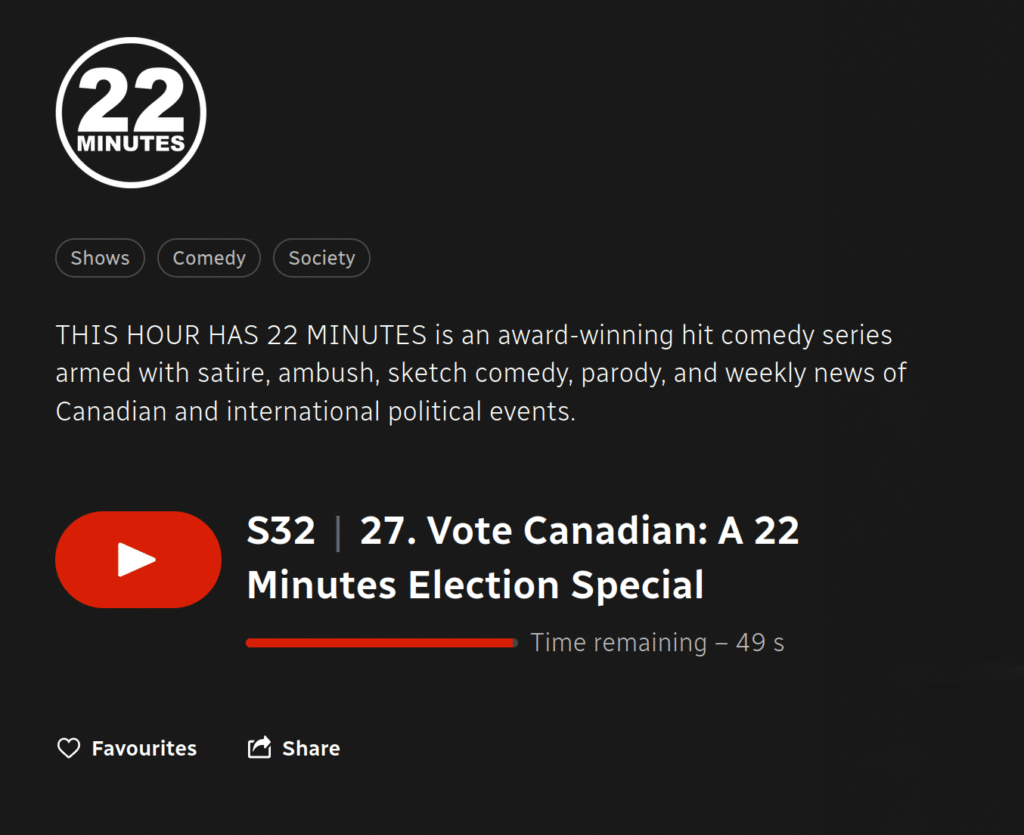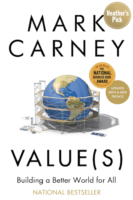This is a great overview of atproto (the protocol under BlueSky) and why it matters.
A story from Srinivas Rao on Medium
Read “99% of AI Startups Will Be Dead by 2026?—?Here’s Why“ by Srinivas Rao on Medium: https://skooloflife.medium.com/99-of-ai-startups-will-be-dead-by-2026-heres-why-bfc974edd968
This Hour Has 22 Minutes Election Special
The This Hour Has 22 Minutes Election Special is hilarious. They go hard at all the parties and party leaders. Really well done. Free to watch on Gem, just need to login.
https://gem.cbc.ca/this-hour-has-22-minutes

Lost Decade? GDP and Immigration
There’s a lot of “Lost Decade” talk which is primarily supported by a chart showing GDP per capita which looks bad for Canada compared to other countries. But Canada’s GDP growth has been second in the G-7 to only the U.S. So why does that chart look so bad?
https://policyoptions.irpp.org/magazines/april-2025/numerator-denominator/
https://policyoptions.irpp.org/magazines/april-2025/canada-alabama/
Per capita GDP has a numerator (GDP) and a denominator (population). Canada’s numerator has not performed badly by international standards. Real GDP growth over the past decade averaged close to two per cent per year, despite a shallow recession in 2015 and a bigger downturn during the COVID-19 pandemic. That’s the second fastest among G7 economies, behind only the U.S.
It’s the denominator, therefore, that explains Canada’s seemingly poor performance by this measure. GDP has grown but not as fast as the population. Indeed, in recent years, Canada has had its fastest population growth since the 1950s. The population grew three per cent in each of 2023 and 2024, almost entirely due to immigrants – two thirds of whom were non-permanent arrivals (on temporary work or student visas).
A question not answered in that article: Will the GDP charts suddenly start looking really good when the visas for large pool of temporary immigrants expire?
Why Mark Carney?
We have entered an unpredictable time. Canada’s relationship with its closest ally is at best different and probably changed for a generation. New international structures, partnerships and alliances will emerge as the U.S. steps back from the role it has had since WW2 (hopefully that step back is temporary).
Why Mark Carney? Experience.
Canada needs to build its place in this new world. That requires building new relationships and rebuilding and enhancing existing ones. This will be hard and requires trust on both sides. Trust takes time to build.
Mark Carney is known and respected internationally. That comes with being the only person to have run two central banks (Canada and UK), leading through two crisis: 2018 financial crisis in Canada and Brexit in the UK, being active with the UN, working to build international banking rules and being on the board of major financial and tech companies. One can see how this has already played out internationally with the warm and friendly way he was received by France and the UK on day one. More personally, I was at a conference in the US two weeks ago and an Irish acquaintance mentioned that “(Carney) was a good guy through Brexit”.
That trust and respect gives Carney the ability to jump in and immediately be productive working with other international leaders and organizations. It took decades to build this respect and trust. It cannot, even by someone exceptional, be built over night.
Canada needs to be at the big table and have the credibility to be taken seriously during this unpredictable time. Carney will get us there, waiting for someone else to get off their international relations and crisis handling training wheels will not.
—
Mark Carney – Values (Book, 2021)

I finished reading Mark Carney’s book Values, written in 2021, a couple of weeks before he won the leadership. I haven’t had time to summarize it properly and I still don’t so this will be short with quotes. When I read, I flag passages to read again. The quotes below are a small subset of those that gives flavor for the book and more importantly, his ideas and how he thinks.

The overarching idea of the book is that markets themselves aren’t a goal. They are a powerful tool that should be pointed to achieving goals good for society. The latter is covered by talking about values, hence the title of the book. The former, how to structure markets to achieve good is discussed in a few ways including setting up the rules and incentives that align rewards with the goals (vs other activities like rent seeking).
At 531 pages, Values is not a short book. It covers a lot of ground from philosophy to markets to complex financial instruments to leadership to a plan for Canada. I found some parts dense, especially the early portions on philosophy and the deeper dives into how complex financial markets work. None of that was unreadable, just dense and required extra focus. Outside of that minor complaint, I found the book educational and even inspiring in some places. The leadership section is surprisingly good (I’ve read many leadership books).
More importantly, given the current election, I came away from reading this book with a lot of confidence that Mark is a strong candidate for the situation we find ourselves in today. I have no delusion that the next few years will be easy or that Mark Carney will make all the problems go away or even make every decision perfectly but he’s clear thinker with a LOT of experience both in finance, the wider economy and international relations. These are all things we need right now.
Below are quotes from the book presented in the order they appear. I have typed these in myself. All typos are mine. Note that many of these quotes are separated by dozens of pages so don’t expect them to flow from one to another.
The market is essential to progress, but it doesn’t exist in a vacuum. It is a social construct whose effectiveness is determined partly by the rules of the state and partly by the values of society. It requires the right institutions, a supportive culture and the maintenance of social license. If left unattended or allowed to capture the political sphere, the market will corrode those values essential to its effectiveness.
When economists promote policies solely on the grounds efficiency, they are making moral assessments. But the judgment of whether a policy initiative is right for society often requires more than the simple utilitarian add-up favoured by economists of costs and benefits that are priced in the market. At a minimum, it requires the highly complex assessments advocated by Sunstein that take into account estimates of a wide range of non-priced attributes, such as mental health, human dignity and agency.
It is critical to remember that banking is not an end in itself, but a means to promote investment, innovation, growth and prosperity.
…, hope is not a strategy and to quote Tim Geithner’s refrain ‘plan beats no plan.’ And a plan that is actually executed is the best one of all. Searching endlessly for the best is the enemy of the good.
This leads to the final lesson I learned about managing crises: the importance of overwhelming force. Fighting a financial fire with half-measures is futile.
This depressing cycle of prudence, confidence, complacency, euphoria and despair reflects the power of the three lies of finance: this time is different, markets always clear, and markets are moral. To break their seductive power, we need to reinforce the underlying values required for the financial system to fulfill its role as a servant, rather than master, of society.
Three components to restoring morality to markets:
aligning compensation with values;
increasing senior management accountability; and
renewing a sense of vocation in finance
As this book has made clear, I am not a market fundamentalist in that I do not reflexively think that the market is the answer to everything. At the same time, I have seen the market’s immense power in multiple situations, and I know that the market is a critical part of the solutions to many of humanity’s greatest challenges.
Trust in the very wealthy and – as discussed in Chapter 7 – the financial sector is also quite low. The response to this lack of trust in institutions has been to look elsewhere. ‘A person like yourself’ is now as credible as a technical expert and for more credible than a CEO or government official…
On social media:
This reliance on news delivered by algorithms which guess users’ preferences based on content they have previously read and liked increases the risk of living in an informational echo chamber. These risks are compounded in a world in which clicks mean revenue. This can reward the shrillest voices and promote the most extreme views.
So run towards the sound of gunfire. Seek to solve your clients’ biggest problems. Take on complex situations, set clear agenda for resolving them and get on them fast.
On leadership and changing the culture at the Bank of England:
From that conversation, Andrew and I had everything we needed to change how we made decisions at the Bank (of England). The essence of the new approach is straightforward:
- Define the purpose of the meeting, including whether it is for decisions, discussions and brainstorm or debriefs
- Include everyone necessary in the meeting and identify who needs to be informed of the outcome. Be as inclusive s possible.
- Ensure everyone has all the necessary information beforehand, that they read it and that they all expect to participate.
- Take clear decisions and ensure immediate follow-up
They (leaders) have to be careful not to bring all those problems with them during every interaction because part of a leader’s job is to absorb the stress so that the rest of the organization can focus. Leaders also need to remember that each of their (many) meetings each day is probably the most important for the others involved. These individuals will carry the experience forward, sharing and even amplifying the values that they discern the leader demonstrating. These tests of authenticity and trust can set in train positive or negative dynamics.
An essential part of clarity is to simplify the complicated, to reduce complex problems to their essentials and then communicate them to your team so that they can be addressed. Say it straight, say it simply. Say it over. (new paragraph) This was a lesson that it took me years to absorb. My nature is to take a deep dive into analysis to understand an issue. This required reading widely, speaking to lots of different people and attempting to synthesize conflicting viewpoints or data. But then having done so, I would be tempted to dump the lot on the audience in an attempt to convince by analytic volume rather than reasoned argument and anecdote. I found over time that while the homework was still essential for trying to come to the right conclusions, people would at best remember the anecdote not the analysis.
The final essential leadership quality is humility. Recall what I said about this chapter being a target-rich environment? Good leaders combine personal humility, self-knowledge and the ability to learn. That means admitting mistakes, seeking and accepting feedback and sharing the lessons. When leaders become overconfident (or turn to writing books), they stop learning.
The boundary of the firm is determined by the balance of these factors, with those activities that can be performed more efficiently and best done by command and control occurring within firms and the rest mediated by through markets.
Finance is utility, a means to an end with the ends determined by society.
As a central banker I had a unique (but sometimes frustrating) vantage point during this time of great change. Armed with reams of data, brilliant colleagues and access to people from all walks of life domestically and globally, I could see much but do relatively little in the face of these big drivers. As we have seen, central banks provide part of what’s needed for prosperity: sound money, a financial system that works in bad times and good. In these respects, central banks are responsible for some basic aspects of the state’s duty to protect. This work is necessary, important and foundational. It is what people should expect. But it is far from sufficient to achieve sustainable growth.
This one is fun, writing in 2021, he predicted the coming inflation:
At the same time, authorities need to recognize that inflation will return, particularly because Covid represents a major negative supply shock.
The public school system must become the route for social mobility and excellence. Allowing a parallel system for the elites is economically, socially and morally disastrous.
Blessed with diverse energy sources including hydro, oil, natural gas, uranium, solar, wind, tidal and biomass, we (Canada) have become the world’s fifth largest energy producer. Our success came from the hard work and ingenuity of our energy industry that has reinvented itself over many years in multiple ways. Building on that long track record of innovation, we are now developing some of the most exciting emerging energy technologies. We have the people, skills, drive and entrepreneurial spirit to realize their potential. But this time we will want greater control over our destiny. Too often we have been a price taker on less-than-advantageous terms, from electricity to heavy oil. We now have the opportunity to help shape a continental energy strategy that achieves a zero-carbon future through a transition that supports all our people in every region.
Many remember Schumpeter’s phrase creative destruction but forget its context. The core of his voluminous writings was his view that capitalism was prone to ossification. In ‘the treason of the clerks’, large companies tend to become self-perpetuating bureaucracies. When coupled with the natural tendencies incumbents towards rent seeking – seeking the rewards of the value created by other people – the treason of the clerks can quell the creative gale. (new paragraph) This is more likely to happen if public policy is pro-business rather than pro-market…
Countries would do well to heed this cautionary tale. It is a gentle slow towards cosy oligopolies. The cost of this quiet life are not immediately apparent, but they grow with time through lost innovation, stilted ideas and growing rent seeking. Eternal vigilance in the name of competition is essential. The future will be made by entrepreneurs we do not yet know.
In recent years, both globalists and nationalists have too often devalued these ideals, and in the process reinforced a narrow, transaction-based sense of nationhood in which nations either cede sovereignty to join larger markets or take it back to win trade wards, respectively. Patriotism is the opposite of such egotistical nationalism. As Emmanual Macron stressed, “By putting our own interests first, with no regard for others, we erase the very ting that a nation holds dearest, and the thing that keeps it alive: its moral values.”
But (as Luke records) of those to whom much is given, much is expected. Recognizing that none of us truly succeeds entirely on our own points to our responsibility for improving the systems in which we work and live. It is the first mark of humility.
Dave Täht
I’m sad to hear Dave Täht passed away. We had many good chats about Bufferbloat in private and on podcasts over the years going way back to ~2009. I remember one time very early in the Bufferbloat work that he reached out and we did some VoIP quality testing and discussed a small pfifo_fast kernel bug that I found.
https://en.wikipedia.org/wiki/Dave_T%C3%A4ht
https://news.ycombinator.com/item?id=43550098
https://lwn.net/Articles/1016109
Here are a couple podcast episodes I had the pleasure of being on with Dave:
https://www.modem.show/post/s01e07
A story from Tom Herbert on Medium
Read “ECMP and Source Routing and Multipath Tables?—?Oh my!“ by Tom Herbert on Medium: https://medium.com/@tom_84912/ecmp-source-routing-and-multipath-tables-oh-my-cbcbb7d2fe5f